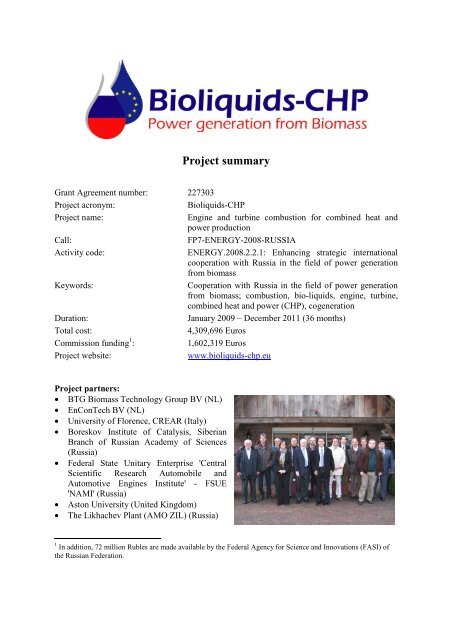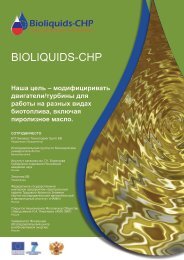Project summary - Bioliquids-CHP
Project summary - Bioliquids-CHP
Project summary - Bioliquids-CHP
Create successful ePaper yourself
Turn your PDF publications into a flip-book with our unique Google optimized e-Paper software.
<strong>Project</strong> <strong>summary</strong><br />
Grant Agreement number: 227303<br />
<strong>Project</strong> acronym:<br />
<strong>Bioliquids</strong>-<strong>CHP</strong><br />
<strong>Project</strong> name:<br />
Engine and turbine combustion for combined heat and<br />
power production<br />
Call:<br />
FP7-ENERGY-2008-RUSSIA<br />
Activity code:<br />
ENERGY.2008.2.2.1: Enhancing strategic international<br />
cooperation with Russia in the field of power generation<br />
from biomass<br />
Keywords:<br />
Cooperation with Russia in the field of power generation<br />
from biomass; combustion, bio-liquids, engine, turbine,<br />
combined heat and power (<strong>CHP</strong>), cogeneration<br />
Duration:<br />
January 2009 – December 2011 (36 months)<br />
Total cost:<br />
4,309,696 Euros<br />
Commission funding 1 :<br />
1,602,319 Euros<br />
<strong>Project</strong> website:<br />
www.bioliquids-chp.eu<br />
<strong>Project</strong> partners:<br />
BTG Biomass Technology Group BV (NL)<br />
EnConTech BV (NL)<br />
University of Florence, CREAR (Italy)<br />
Boreskov Institute of Catalysis, Siberian<br />
Branch of Russian Academy of Sciences<br />
(Russia)<br />
Federal State Unitary Enterprise 'Central<br />
Scientific Research Automobile and<br />
Automotive Engines Institute' - FSUE<br />
'NAMI' (Russia)<br />
Aston University (United Kingdom)<br />
The Likhachev Plant (AMO ZIL) (Russia)<br />
1 In addition, 72 million Rubles are made available by the Federal Agency for Science and Innovations (FASI) of<br />
the Russian Federation.
<strong>Project</strong> justification<br />
The EC has set a target to increase the share of combined heat and power (<strong>CHP</strong>) in the European<br />
energy supply to 18% in 2010. One of the objectives is to develop energy systems for remote<br />
regions with a special emphasis on the integration of renewable energy. So far, the implementation<br />
of small-scale (50 to 1000 kW e ), direct biomass-to-electricity <strong>CHP</strong>-systems has been rather limited.<br />
The main reasons include:<br />
Relatively high investment costs for small-scale systems<br />
High running costs<br />
Poor reliability and availability<br />
Low acceptance by end-users<br />
The factors causing these intrinsic problems are manifold, but main causes include:<br />
The presence of contaminants in the biomass (apart from ash, oxygen and water can also be<br />
considered this way)<br />
The limited availability of uniform types of biomass<br />
The non-uniform appearance of biomass<br />
Its general low energetic density (especially in terms of GJ/m3), requiring huge volumes of<br />
biomass stocks to be stored near the electricity production unit<br />
<strong>Bioliquids</strong> are defined as liquids fuels produced from biomass and used for energy purposes other<br />
than transport. Their energy purposes include electricity production, heating and cooling.<br />
Converting biomass into bioliquids increases the acceptance by end-users, as they are uniform and<br />
easier to use. The <strong>Bioliquids</strong>-<strong>CHP</strong> project was set up to break down the technical barriers<br />
preventing the use of bioliquids in engines and turbines.<br />
<strong>Project</strong> objectives<br />
The aim of the project is to adapt<br />
engines/turbines to enable operation on a<br />
variety of bioliquids, including pyrolysis<br />
liquids.<br />
On the one hand, the project will modify the<br />
design of a diesel engine and a micro gas<br />
turbine so that these can run efficiently on<br />
bioliquids such as biodiesel, vegetable oil<br />
and pyrolysis oil. On the other hand,<br />
bioliquids will be upgraded and blended in<br />
order to facilitate their use in engines and<br />
turbines. Thus, the most economic and<br />
reliable engine/turbine-bioliquids<br />
combinations will be developed in order to<br />
make the system attractive. In addition, the<br />
project will develop methods and techniques<br />
to control exhaust emissions (NO x , CO,<br />
particulates), which will improve the<br />
environmental sustainability of the<br />
engine/turbine-bioliquids combinations.<br />
<strong>Bioliquids</strong>-<strong>CHP</strong> project overview
Research issues<br />
A fundamental problem of pyrolysis liquid is its rather low heat content and its high ignition<br />
temperature. Other problems derive from its corrosive properties and its relatively low<br />
polymerisation temperature (
Reports on the characterization of feedstock samples in relation to combustion properties and<br />
emissions.<br />
Report on pyrolysis oil upgrading tests<br />
Report on bio-liquids mixing / emulsification tests<br />
Study of technical feasibility of micro gas turbine and report on major adaptation description.<br />
Reports on engine modifications and testing of new developed components and engine.<br />
Report on the construction and final testing of the integral exhaust gas cleaning system.<br />
Information for developers to address planning and other regulations associated with<br />
installation of Bio-oil <strong>CHP</strong> applications.<br />
Expected impacts of the project<br />
Strategic impacts of the project include:<br />
Increase in electricity production from biomass by reducing bio-oil production prices and by<br />
improving bioliquid quality.<br />
Reduction of costs of electricity production from biomass.<br />
Optimisation of the engine-bioliquid fuel combination<br />
Adaptation of existing technologies (Bioliquid production, diesel engines and <strong>CHP</strong>-units) with<br />
a view to optimise the engine- fuel combination<br />
Improvement of the environment, the quality of life, health and safety.<br />
Job creation.<br />
<strong>Project</strong> management<br />
Overall coordination:<br />
John Vos<br />
Tel. +31-53-486 1186<br />
Email: vos@btgworld.com<br />
Technical issues:<br />
Bert van de Beld<br />
Tel. +31-53-486 2288<br />
Email: vandebeld@btgworld.com<br />
The project is funded through the European Commission (7th Framework Programme, Grant FP7-<br />
227303) and the Federal Agency for Science and Innovation of the Russian Federation (FASI<br />
contract 02.527.11.0003).<br />
This document reflects only the project consortium’s views, the European Community is not liable<br />
for any use that may be made of the information contained herein.




